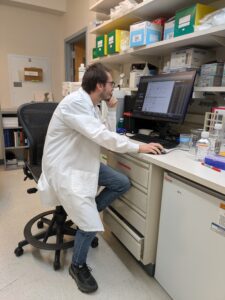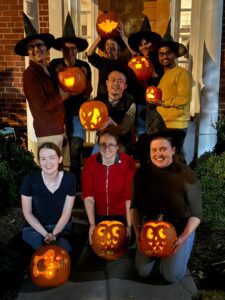Nicolas Merle is a postdoctoral researcher at the Cordeliers Research Centre, INSERM, France who received an EACR Travel Fellowship to visit and work at the National Institute of Health in the US between 01 October and 17 November 2024.
The EACR, with support from Worldwide Cancer Research, provides Travel Fellowships of up to €3,500 to enable early-career cancer researchers to gain new skills through a short-term visit to a lab or research group in another country.
You can read about other Travel Fellows and their experiences here.
 Name: Nicolas Merle
Name: Nicolas Merle
Job title: Postdoctoral researcher
Home institute: Cordeliers Research Centre, INSERM, France
Host institute: National Institute of Health in the US
Dates of visit: 01 October – 17 November 2024
Research: This project investigates CD4 T cells and how the membrane-bound protein CD109 regulates their activation, acting as a “brake” to balance their pro-inflammatory function. I discovered a novel role for CD109 in controlling CD4 T cell activation and, with my former team, developed a peptide that disrupts CD109’s function. This peptide enhances CD4 T cell efficacy in pathological contexts. The EACR supported the final phase of the project, which tested the peptide’s therapeutic potential in a cancer model, paving the way for innovative immunotherapy strategies.
Why did you choose to apply for an EACR Travel Fellowship?
The intellectual property restrictions surrounding the peptide I developed posed challenges in selecting labs for collaborations on CAR T cells. Fortunately, the NIH hosts an exceptional array of talented researchers across various fields. Dr. Nguyen, a promising expert in CAR T cells and neuroblastoma, stood out as an ideal collaborator, especially given my focus on cancer biology and the complement system’s potential role in brain cancers. Additionally, recognising the growing importance of bioinformatics in scientific research, I collaborated with Dr. Afzali’s lab, which excels in omics-based investigations of immune cell mechanisms, making it an excellent partner for advancing my project.
Can you summarise the research you did?
I conducted in vitro experiments on human CD4 T cells to evaluate the function of the inhibitory peptide I developed. This involved isolating cells from freshly collected human blood and activating them in tissue culture plates, with or without the peptide. In parallel, I compared the peptide’s effects to those observed in CD109-depleted cells using CRISPR/Cas9 technology. To test the peptide’s relevance in a more robust model, I learned the CAR T cell protocol, generating specific T cells targeting a GFP-reporter glioma cell line. I independently performed all steps, culminating in a killing assay where CAR T cells were co-cultured with GFP-reporter cancer cells in the presence or absence of the peptide. Notably, the peptide enhanced CAR T cell killing activity compared to the control, validating CD109’s role in T cells within a cancer model and highlighting the therapeutic potential of the peptide. I also learned to analyse scRNAseq with Dr. Afzali, which was essential to understand how CD109 expression on T cells influences the immune microenvironment in a mouse model.
“My visit to the NIH has been highly beneficial to my career”
Describe a ‘typical day’ on your visit.
I divided my time between different labs, spending the mornings in Kemper’s or Afzali’s labs setting up in vitro experiments, and the afternoons in Nguyen’s lab working on CAR T cell generation. As I was largely autonomous in conducting my in vitro experiments, I dedicated most of my afternoons to working closely with Ira Phadke, a post-doctoral fellow who guided me through all aspects of CAR T cell generation.
What were you able to do that you could not have achieved in your home lab?
This project began during my time as a postdoctoral fellow at the NIH, where I developed a peptide now under evaluation for patenting. Returning to the US with an EACR Travel Fellowship provided access to the peptide, allowing me to conduct critical experiments to validate its function on T cells. Additionally, I used this opportunity to collaborate with Dr. Nguyen and acquire expertise in CAR T cell generation and testing—an advanced technique not currently available in my home lab.

Did you take part in any interesting local or cultural activities?
During my time, I had the pleasure of experiencing Halloween with Dr. Afzali and his lab, where we held a pumpkin carving contest (which I proudly won, despite a somewhat biased jury!). It was also the beautiful fall season on the East Coast, allowing me to explore the Atlantic coast, enjoy the crisp weather, and marvel at the stunning yellow and orange foliage adorning the trees.
Have you brought back any specific knowledge or technique that has benefited your home lab?
Having learned to generate CAR T cells, I plan to establish this protocol in my home lab for future research endeavors.
Does your lab plan to do any future collaboration or publication with the host lab?
My goal is to establish myself as a full-time researcher in my home lab, focusing on the non-canonical roles of the complement system in cancer cells and its impact on the tumour immune microenvironment. To enhance this work, I aim to build collaborative bridges with the three NIH labs, leveraging their expertise in cellular immunology (Kemper and Afzali labs) and cancer biology (Nguyen lab). Specifically, I plan to incorporate CAR T cell technology into my research to further explore the unconventional functions of complement proteins in T cells.
How has this visit been beneficial to your research and your career?
My visit to the NIH has been highly beneficial to my career, bringing me closer to publishing an article on CD109’s role in CD4 T cells, which I aim to submit by early 2025. I also improved my bioinformatic skills which will be critical for the projects I plan in my career.
Want to find out more?
If you are interested in applying for the Travel Fellowship scheme, please click here for more information: EACR Travel Fellowships.










